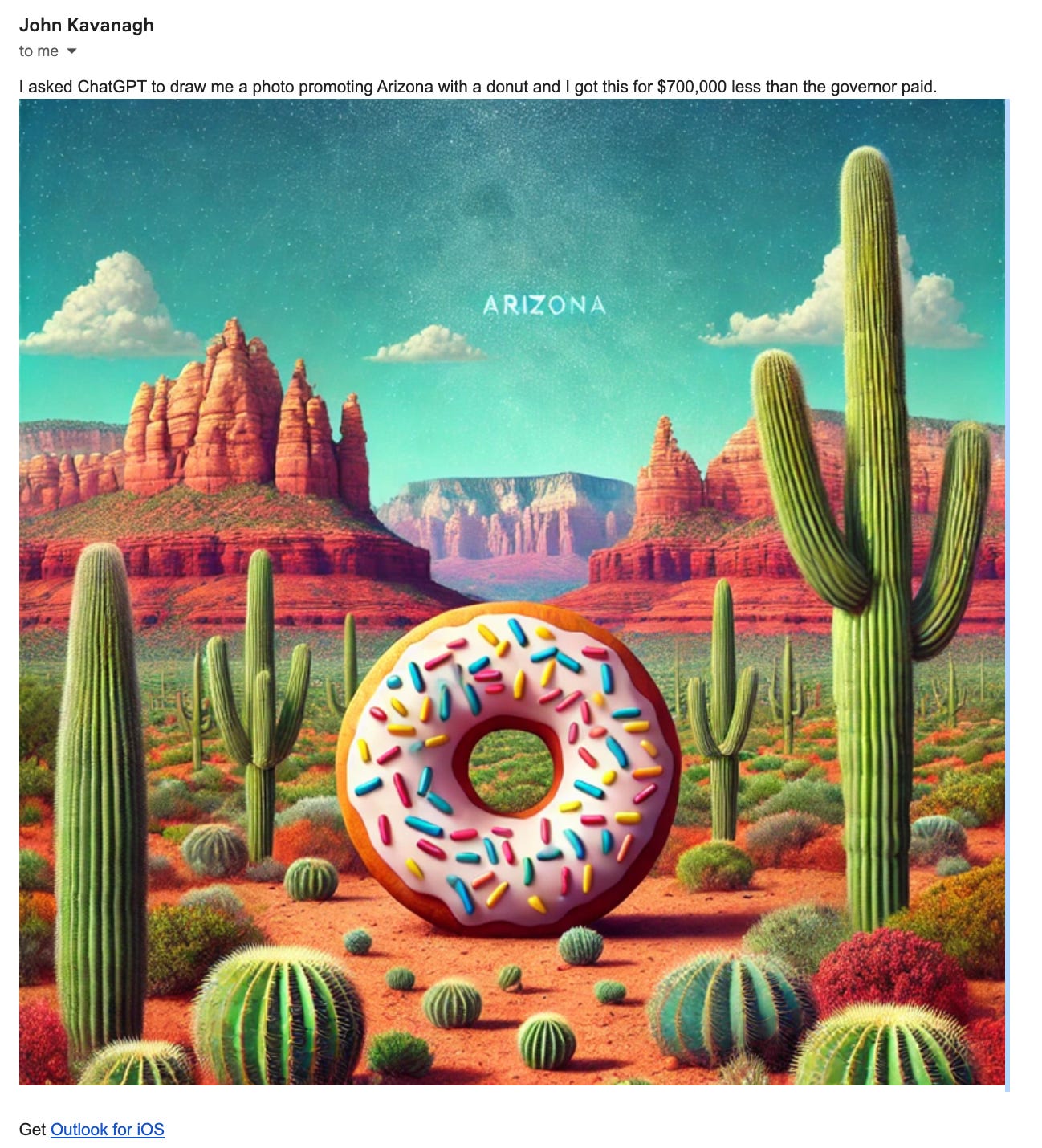Keeping record
The custodians of controversy … The court of consequences … And ChatGPT is cheaper.
The cascade of events after the 2020 election and the Jan. 6 Capitol attacks has seeped into the politics of what was once a largely non-political position.
Arizona’s county recorders are charged with three main tasks: overseeing the voter rolls, conducting early voting and maintaining public records like the deed to your house.
All 15 county recorders are up for election in November. But most of these races aren’t characterized by experience — they’re battles of belief systems.
Republican Rep. Justin Heap, for example, ousted Maricopa County Recorder Stephen Richer in the primary. Heap has been tied to election conspiracists and voted for election access-limiting laws, while Richer steadfastly defended the integrity of the county’s elections systems.
In Cochise County, the recorder who went along with plans for an illegal hand count in 2022 is seeking reelection, while in Yuma County, a self-proclaimed “RINO hunter” who spoke at the Republican National Convention has already ousted the incumbent recorder.
Most recorder races have already been pretty much determined by the registrations of the counties’ voter bases. Republican counties will likely elect Republican recorders, and Democratic counties will probably elect Democratic recorders.
But with the intense focus that these previously obscure positions are now receiving, there may be upsets on the horizon.
And it wouldn’t be the first time.
In 2016, Democrat Adrian Fontes defeated longtime Republican incumbent Maricopa County Recorder Helen Purcell, making him the first Democrat to hold the office in decades. Four years later, Richer unseated Fontes, returning the seat to Republicans.
So today, we’re breaking down the six most interesting county recorder races across the state so you know what’s at stake when you elect your local arbiters of democracy.
Maricopa
County Recorder Stephen Richer, who earned a “RINO” moniker for assuring voters that Maricopa County’s election process is secure, lost his reelection campaign to Republican challenger Rep. Justin Heap.
Heap is, in many ways, on the other side of the conservative spectrum. While he’s stayed away from flat-out election denialism on the campaign trail, he’s a member of the far-right Freedom Caucus, which has spouted election conspiracies and sponsored legislation to change how elections are conducted. Sen. Jake Hoffman, who’s facing several felony charges for his role in attempting to overturn the 2020 election results, said on Twitter he “was proud to recruit Justin to run.”
The primary election results have readjusted the spotlight on Democratic candidate Tim Stringham, a career military officer and U.S. Navy attorney who said he was inspired to run after the Jan. 6 attacks.
Stringham is using his veteran status and a promise to preserve the mail-in voting system to try to beat Heap, and he’s the only candidate for recorder who hasn’t called elections in Arizona’s largest county a “laughing stock.”
Cochise
Cochise County became a hotbed of election distrust and the focus of international headlines after two county supervisors refused to certify the 2022 election results and called for a hand count of all the ballots.
Those supervisors, Tom Crosby and Peggy Judd, are now fighting felony charges, and the contenders for county recorder are fighting for votes under the lens of election integrity.
Cochise County Recorder David Stevens has held the spot since 2016. He’s a former state lawmaker who facilitated the two supervisors’ calls for hand counts, as Votebeats’ Jen Fifield reported.
The county’s former elections director, Lisa Marra, refused to hand over the ballots and left the office over hostile working conditions. She’s now the state elections director. But Marra’s departure gave Stevens near full control of the county’s elections systems after the board of supervisors passed off Marra’s duties to him. That lasted until April despite lawsuits posing clear separation of power concerns.
Stevens faces a challenge from Democrat Anne Carl, a civil and criminal deputy for the Cochise County Attorney and former opera singer. On her campaign website, she claims if elected, she will “serve all County residents by fixing problems — not making them.”
Coconino
Coconino’s recorder, Patty Hansen, has held the spot since 2012, but she’s retiring this year after more than three decades in the election administration business. Hansen’s departure from the office could also signal a departure from the calm.
Former four-term state lawmaker Bob Thorpe, a Republican, wants to take over. He previously bowed out of a 2020 state Senate bid, then ran an unsuccessful campaign for a Coconino County Board of Supervisors spot instead.
Thorpe opposes “computer” voting machines and permanent early voter lists and wants to require photo IDs to vote, per his campaign website. That website lists off his experience in direct contrast to his opponent, Democrat Aubrey Sonderegger.
Sonderegger lists political experience with the county's Democratic Party and writes on her campaign website: “In a period when government distrust is prevalent, this office must continue to be a source of dependability and confidence.”
Navajo
Democratic County Recorder Michael Sample has held the post since he was appointed in April 2020 and elected in November 2020. He’s facing a challenge from Republican Timothy Jordan, who wants to get rid of ballot drop boxes, use mail-in voting by request only and purge illegal and felony voters from the voter rolls “who are already casting ballots elsewhere,” he says on his campaign website. He also makes a mean mashup video.
Navajo County is nearly 10,000 square miles, and about two-thirds of that are Native American reservations. It can be extremely difficult for people to vote here, as the Arizona Mirror’s Shondiin Silversmith detailed in her visit to polling places throughout the Navajo Nation during the primary, where she hit 10 vote centers after driving more than 250 miles. The county only has 39 polling places.
We didn’t find any comprehensive plans to address this in either candidate’s campaign materials. Sample’s bio on Navajo County’s website points to adding kiosks throughout the county for residents to record documents and putting ballot drop boxes in rural areas.
Pinal
Republican Dana Lewis is the only contender for Pinal County’s recorder. She’ll hold four more years in the office after she was first appointed in 2022. The county saw a disastrous midterm election with ballots sent to voters without all the races printed on them and a discrepancy of 500 votes in the general election tally, and county supervisors tasked Lewis with cleaning up the mess.
But Pinal County Supervisor Kevin Cavanaugh, who lost his bid for sheriff in the primary, then claimed his county’s election must have been rigged, and asked the elections department if he could be placed on the November ballot as a write-in candidate for county recorder, according to local political blog The SB Insider.
Earlier this year, Cavanaugh threatened Lewis with a defamation lawsuit and demanded she be removed from office. He alleged Lewis spread rumors that he wiretapped her. It was weird.
Yuma
Yuma County Recorder Richard Colwell was appointed to the spot in 2022 to replace longtime Recorder Robyn Stallworth Pouquette.
But his term didn’t last long.
Colwell lost his election bid in the Republican primary to David Lara by just 47 votes.
Lara has been in the news lately for speaking at the Republican National Convention as one of 24 "everyday Americans" chosen to tout Donald Trump as the Republican presidential nominee.
“Imagine strangers terrorizing your homes … and local schools fearful to let children walk home,” he said of his experience living in a border town.
But that coverage didn't include his attempt to oust Yuma County’s Recorder and take control of the county’s elections systems. Yuma County consolidates the roles typically separated between a recorder and election director, so the county recorder controls the voter rolls, public records and elections.
Lara is a Yuma Union High School District board member who defines himself in his Twitter bio as “Rino slayer, mule skinner.”
He’ll face Democrat Emilia Cortez in the upcoming election after she received 810 write-in votes in the primary, enough to earn her spot on the November ballot.
Court cases (barely) have consequences: The Arizona Supreme Court changed the rules for who can submit complaints to the state Bar to weed out complaints from people who are not directly involved, the Republic’s Jimmy Jenkins reports. The move comes after the Bar received an “explosion of complaints” (meaning about 40) regarding lawyers involved in election fraud cases. Meanwhile, a Bar complaint review panel shot down a complaint against Kari Lake’s attorneys Kurt Olsen and Andrew Parker, who represented her case challenging electronic voting machines, per the Republic’s Stacey Barchenger. Finally, a judge once again says Lake has to turn over documents that should help decide how much in damages she owes Maricopa County Recorder Stephen Richer in his defamation lawsuit against her, per the Arizona Mirror’s Caitlin Sievers.
What’s a few more years?: Arizona’s fake electors won’t start going to trial until at least January 2026, 12News’ Brahm Resnik reports, meaning it’s not even clear if Attorney General Kris Mayes will be in office by the time the case fully wraps up.
Pay up: Yavapai County Sheriff David Rhodes says that if voters approve the Secure the Border Act, he can’t afford to implement it without additional funds, which the act doesn’t provide. It’ll be up to lawmakers to ensure the law, which he isn’t a huge fan of, actually gets carried out, he told Lauren Gilger on KJZZ’s “The Show.”
“If the people of Arizona choose to pass this … (then) this is a mandate from the majority and we expect the Legislature and the governor to appropriate the necessary resources,” he said.
Billable hours: Kirsten Engel, the Democratic nominee for Southern Arizona’s Congressional District 6, overbilled the federal government back in 1993 as a staff attorney for the Sierra Club Legal Defense Fund, the Washington Examiner reports. A panel of judges took her to task, saying “intolerably excessive” fees were a “serious transgression.”
Help cover the overblown attorney’s fees we’ll
inevitably have to pay someday for writing this
snarky little newsletter. Subscribe today!
Dune buggies under budget: Arizona Superintendent of Public Instruction Tom Horne said his office came in under budget, which he says proves that all the money the state is spending on school vouchers “do not result in any part of the budget deficit.” Meanwhile, the State Board of Education decided on Monday that dune buggies are not a legitimate educational expense that school vouchers should pay for, the Republic’s Nick Sullivan reports. Yeah, someone bought three dune buggies with their school vouchers.
Read up: The Republic released its guide to local city council candidates across the valley, not to mention some of the local issues that are on valley residents’ ballots.
Arizona Agenda reader (and Republican state senator) John Kavanagh is not a fan of the new state branding, declaring it must have been designed by the Krispy Kreme doughnut franchise or perhaps a bagel shop.
They were mildly funny takes on a mildly embarrassing state branding attempt.
But the email he sent us today shows why he’s among Arizona’s top politicians: This is a man who knows his audience.









